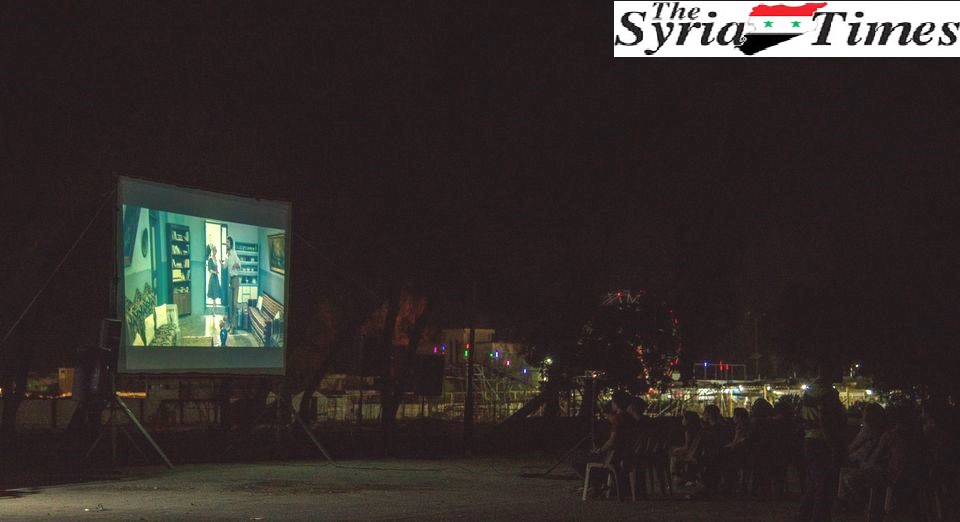Damascus Citadel hosted an exceptional event during exceptional circumstance. The First Citadel Festival for Cinema Student, which was organized under the patronage of the Ministry of Culture, and inaugurated by the Minister of Culture, Dr. Lubana Al Mouchawh; displayed a number of short films produced by students studying cinema production and film directing from Syria, the Arab world and foreign countries.
Martin Scorsese very intensified expression in regards of cinema: “Cinema is a matter of what’s in the frame and what’s out,” a question posed to the benefactors and beneficiaries of the First Citadel Festival for Cinema Student. Within the frame and under cameras’ scrunity was the daily and social aspects of life, where symbolism prevailed over most scenes of participating films.
Most participating Syrian films were produced by Youth Cinema Support Project and graduation projects of students of the Technical Institute of Applied Arts; reflecting their ambitious experiences and new ideas that urgeed them on their first steps in the world of the seventh art.
 Suzan Sobha, a graduate of the Applied Art Institute, participated in a 13-minute film about a young man who experiences remorse after several illicit affairs with girls. She indicated that the festival provides support for young amateurs and opens new horizons in front of them to enter the work market strongly. Razan Al-Lahham expressed her happiness in displaying her film at the festival, which is her graduation project. It tells about nightmares that accompanie each of us, yet differs from one to another.
Suzan Sobha, a graduate of the Applied Art Institute, participated in a 13-minute film about a young man who experiences remorse after several illicit affairs with girls. She indicated that the festival provides support for young amateurs and opens new horizons in front of them to enter the work market strongly. Razan Al-Lahham expressed her happiness in displaying her film at the festival, which is her graduation project. It tells about nightmares that accompanie each of us, yet differs from one to another.
The story of the film Risalah Um (A Mother’s letter), directed by Maram Al-Khatib, revolves around the suffering of a mother with cancer and the letter she left before her death. Maram dedicated the film to her mother’s soul as she died of the same disease.
Sawsan Shams El Din tries, through her film Sewar( Bracelet), aimed to shed light on the impact of life pressures on a young man, who got addicted to drugs to escape from domestic and emotional problems; until his mother is able to treat him through music. Shams El Din hoped that such festivals would be given more attention to support to help young film producers and develop their talents.
Whereas, Roshen, which means the line dividing day and night, directed by graduate Nawras Bahlawan, talksabout the suffering of a desperate person who lives within his own shell. Bahlawan pointed out to the importance of this festival to amateur youth ncinema in addition to the gained experience from learning of Arab and foreign cinema.
 Regarding the evaluation criteria of the films jury, a member of the committee, director Ali Al-Aqbani, said that “the jury takes into consideration the cinematic vision of the participating films and how they addressed issues such as the idea, image, movement and staff.” Al-Aqbani indicated that the committee also takes into account the festival’s orientation toward amateurs’ filmmakers without experience, with little capabilities, which highlights the importance and need to help them open horizons toward short films making.
Regarding the evaluation criteria of the films jury, a member of the committee, director Ali Al-Aqbani, said that “the jury takes into consideration the cinematic vision of the participating films and how they addressed issues such as the idea, image, movement and staff.” Al-Aqbani indicated that the committee also takes into account the festival’s orientation toward amateurs’ filmmakers without experience, with little capabilities, which highlights the importance and need to help them open horizons toward short films making.
Finally, the following expression was the advice of one of the most influential and extensively studied filmmakers in the history of cinema, Alfred Hitchcock, Known as the “Master of Suspense.”
“In many of the films now being made, there is very little cinema: they are mostly what I call ‘photographs of people talking.’ When we tell a story in cinema, we should resort to dialogue only when it is impossible to do otherwise. I always try to tell a story in the cinematic way, through a succession of shots and bits of film in between.”
Report: Lama Alhassanieh

